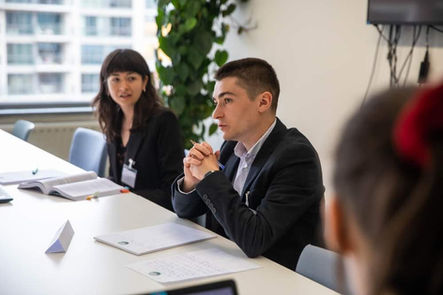
Édition 2021
Stands d'information
Cette partie, animée par des membres de l'Association, s'est déroulée en live sur les réseaux sociaux de l'AEDIN.
Moot Courts
Concours Charles-Rousseau
L'équipe nanterroise, composée de Lucas Dal Molin, Noémie Patarozzi, Morgane Petrignet et Seyon Kanagasooriar, a remporté le Prix Charles-Rousseau de la meilleure équipe à l'occasion de l'édition 2021. A cette occasion, Lucas Dal Molin y a également remporté le prix du meilleur plaideur de la finale.
Pendant l'édition 2022, Nicolas Montauzer a remporté le neuvième prix de plaidoirie.
Pendant l'édition 2023, l'équipe nanterroise composée de Sarah Manabre, Evan Ouinez, Elaïs Drumeaux et Bertille Desoutter ont remporté le cinquième prix de mémoire.
The Charles-Rousseau Competition is a French-language mock trial competition in international law, created in 1985, open to academics from higher education institutions from all countries and intended to develop knowledge and mastery of public international law. It is held annually in the spring in a different city. Each participating institution normally presents two teams of two litigants, each representing one of the two Parties to the dispute. The teams compete against each other around a fictitious case, for which they must present briefs and then plead before specialists in international law .
Each year, between 150 and 200 people from all regions of the world meet for the oral examinations of the Competition : teams of students and their instructors coming to participate, academics, professors and practitioners acting as jury. Since its creation, the Competition has taken place 3 times in Sherbrooke, 1 time in Lyon, 5 times in Brussels, 3 times in Montreal, 4 times in Geneva, 3 times in The Hague, 2 times in Quebec, 4 times in Paris, 3 times in Tunis, 1 time in Kiel-Hamburg, 1 time in Beirut, 1 time in Clermont-Ferrand, 1 time in Bucharest, 1 time in Sceaux, 1 time in Havana, 1 time in Cotonou. More than one hundred institutions from 35 different countries took part: Algeria, Germany, Argentina, Belgium, Benin, Brazil, Bulgaria, Burkina Faso, Burundi, Cameroon, Canada, Colombia, Congo, Ivory Coast, Egypt, United States America, France, Greece, Hungary, Lebanon, Morocco, Moldova, Democratic Republic of Congo, Czech Republic, Romania, United Kingdom, Russia, Rwanda, Senegal, Switzerland, Chad, Togo, Tunisia, Ukraine, Venezuela.
(Source: http://www.rfdi.net/presentation-du-concours-charles-rousseau/)
Concours René Cassin
It was at the initiative of Strasbourg students that the first edition of the European Human Rights Competition was organized in 1985, thus paying tribute to René Cassin, one of the fathers of the Universal Declaration of Human Rights. Male, former President of the European Court of Human Rights and Nobel Peace Prize winner.
Their ambition is to allow students from all over the world to compete on the basis of a fictitious dispute brought before the European Court of Human Rights.
Thanks to the investment of all the volunteers (students, professors, etc.) and the support of numerous institutions, the competition quickly established itself as the most important manifestation of mock trials in European Convention law.
Now organized under the sponsorship of the International Institute of Human Rights-René Cassin Foundation, the University of Strasbourg and the Bar Association of Strasbourg, the competition welcomes more and more participating teams (32 in 2020).
(Source: https://www.concourscassin.com/index.php?p=presentation)
Jean Pictet Moot Court
A l'occasion de l'édition 2022, Alix Dubois a remporté le Prix Gilbert-Apollis.
The Jean-Picte t Competition is a unique training course in international humanitarian law for students. His goal: to get law out of the books.
The Jean-Pictet Competition is a training event in international humanitarian law (IHL) for students (law, political science, military academies, professional institutes, etc.) taking part in the Competition in teams of three.
The 48 teams selected, usually from the five continents , benefit from distance training in IHL. They then meet for a week in a place that changes every year, for the Competition itself. They compete in simulations and role-playing games built around a fictitious armed conflict. The teams must play the role of actors in armed conflicts (military, humanitarian workers, lawyers, political leaders, etc.) in a broader and richer context than the purely judicial context. The teams benefit from the supervision of tutors in the events where they are evaluated by the jury. All the tests of the Competition are taken orally - no writing is required, apart from the application file.
Procès simulé devant la CPI
A l'occasion de l'édition 2022, Clarisse Riou a remporté le prix du meilleur plaideur lors des phases de poules.
Le Concours de Procès simulé devant la Cour pénale internationale simule une affaire susceptible d’être portée devant la CPI où des équipes d’étudiants francophones ont la possibilité de mettre en pratique leur savoir et d’incarner dans une affaire fictive une partie à la procédure devant la CPI. Le Concours consiste en trois phases consécutives : une phase relative aux mémoires, une phase orale, à laquelle les dix meilleures équipes pourront participer, et la finale.
Organisé par l'Académie de droit international de La Haye, en partenariat avec la Cour pénale internationale et le Ministère français de l'Europe et des Affaires étrangères, le concours verra sa première édition se dérouler à La Haye en 2022.













